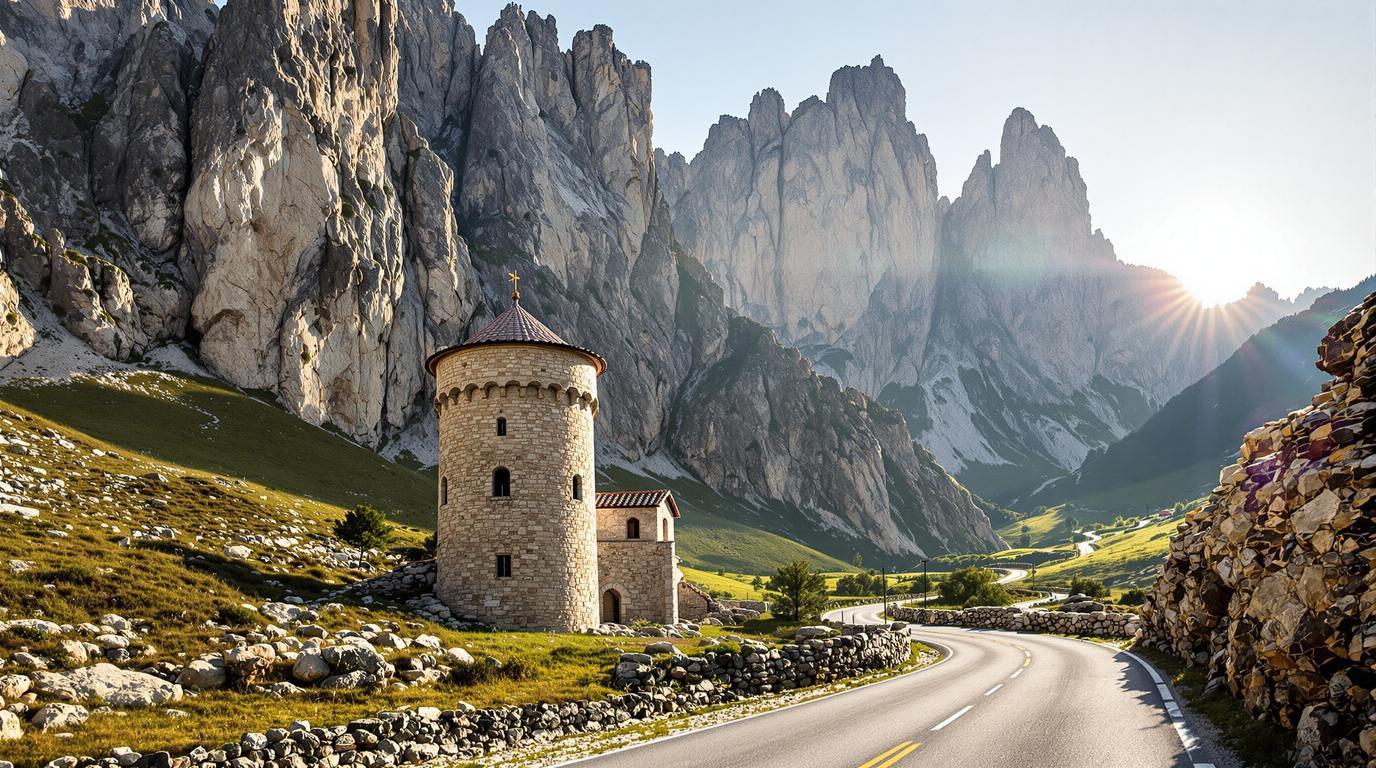The unpaved mountain road winds through limestone peaks for 24 kilometers, each turn revealing why Albanian locals whisper warnings about their 750-meter sanctuary. I discovered Theth during a research expedition into the Albanian Alps, where traditional stone tower houses rise from karst valleys like ancient sentinels. The village sits in a protected bubble of time, where the medieval Kanun laws still govern daily life and summer tourists have exactly four months before winter snows seal the mountain passes.
This isn’t another European mountain village clinging to tourism fame. Theth exists in defiant isolation, where 200 residents have watched their ancestral home transform from forgotten hamlet to reluctant destination. The controversy isn’t about visitor numbers—it’s about preservation versus survival, tradition versus necessity.
Standing at the village center, surrounded by peaks reaching 2,500 meters, you realize why locals guard their secrets so fiercely. This landscape shaped a culture that tourism threatens to reshape forever.
The limestone sanctuary locals refuse to commercialize
Why Theth’s traditional architecture faces an uncertain future
The distinctive stone tower houses of Theth tell stories of clan warfare and mountain survival that predate any tourist guidebook. Built from local limestone and timber, these defensive structures served as family fortresses during centuries of tribal conflicts. Today, 25 traditional inns operate within these historic walls, but recent government demolitions of illegal tourist cabins sparked village-wide protests. Residents invested life savings—up to $200,000—building guesthouses that authorities later destroyed without warning, creating deep mistrust of tourism development.
The Kanun laws that still govern village life
Theth operates under the ancient Kanun customary laws, a medieval legal code that survived Ottoman rule and communist suppression. These oral traditions regulate everything from hospitality duties to property disputes, creating a living museum of Albanian mountain culture. Unlike other European historic villages that preserve medieval structures as attractions, Theth’s traditions remain functional, not performative, making locals protective of their cultural authenticity.
The summer window closing faster than tourists realize
Why access becomes impossible after October
The 70-kilometer journey from Shkodra becomes increasingly treacherous as autumn approaches, with the final 24-kilometer stretch through mountain passes susceptible to early snowfall. Local guides confirm that November through March renders the village effectively cut off, with only the most determined residents remaining through the isolation. This seasonal accessibility creates intense pressure on the brief summer tourism window, when 15,000 visitors compress their experiences into four precious months.
The infrastructure crisis threatening village survival
Theth’s 100 households now depend on tourism income, but rapid growth has outpaced infrastructure capacity. Water systems strain under summer demand, waste management struggles with visitor volume, and the narrow mountain road suffers damage from increased traffic. Similar mountain villages face comparable challenges balancing authentic experiences with tourist impact, but Theth’s extreme isolation amplifies every problem.
Travel Note: Village elder Bal Vuksani told me, “Tourism became our main income source, but we fear losing what makes us special. The landscape shouldn’t be destroyed for temporary profit.”
The authentic mountain experience tourists rarely discover
Beyond the crowded hiking trails
While most visitors focus on the popular Grunas Canyon waterfall, locals quietly direct respectful travelers to lesser-known geological wonders. The highest rock face in the Balkans rises from Arapi peak, creating dramatic limestone formations that rival anything in the Dolomites. Traditional shepherding paths lead to alpine meadows where families still practice centuries-old pastoralism, offering glimpses of authentic mountain life that package tourism can’t replicate.
The cultural immersion locals share reluctantly
Authentic experiences emerge through patient relationship-building rather than tourist transactions. Families occasionally invite respectful visitors to witness traditional crafts like wood carving and stone masonry, skills passed down through generations. Like other mountain communities seeking alternatives to mass tourism, Theth residents prefer meaningful cultural exchanges over superficial tourist encounters.
Planning your visit before the window closes
What July 2025 conditions reveal about timing
Current road conditions remain favorable through September, but accommodation availability has decreased following recent demolitions. Legitimate guesthouses require advance booking, and certified guides are mandatory for accessing protected areas within Theth National Park. Temperature ranges from 16-22°C during summer months, providing comfortable conditions for hiking and cultural exploration.
Why Valbona Valley offers different challenges
The neighboring Valbona Valley, 30 kilometers east, presents similar alpine beauty with different access dynamics. While both villages share limestone geology and traditional architecture, Valbona’s tourism infrastructure has developed differently, creating alternative experiences for visitors seeking authentic Albanian Alps encounters without contributing to Theth’s overcrowding concerns.
Essential questions about visiting Theth
How difficult is the mountain road access?
The 24-kilometer unpaved section requires careful navigation but remains accessible to standard vehicles during summer months. Allow 2-3 hours for the complete journey from Shkodra, with potential delays during peak season traffic.
What makes Theth different from other Albanian destinations?
Theth maintains active traditional culture rather than preserved historical displays, with residents practicing ancient customs while adapting to modern tourism pressures. The village operates under customary laws that create authentic cultural experiences unavailable in more commercialized destinations.
When do mountain passes become impassable?
November through March typically sees road closures due to snow, though early October weather can begin affecting access. Plan visits between June and September for optimal conditions and full village accessibility.
How can visitors support local communities responsibly?
Choose licensed accommodations, respect traditional customs, hire certified local guides, and minimize environmental impact. Support families who have invested in legitimate tourism infrastructure rather than contributing to unregulated development.
The 750-meter sanctuary of Theth exists in a delicate balance between preservation and survival, where ancient traditions meet modern tourism pressures. Each visitor’s choices influence whether this remarkable mountain culture survives authentically or disappears beneath the weight of well-intentioned but destructive tourism. The four-month window offers genuine encounters with Albanian Alps heritage, but only for those willing to engage respectfully with a community still deciding whether tourists represent opportunity or threat.
